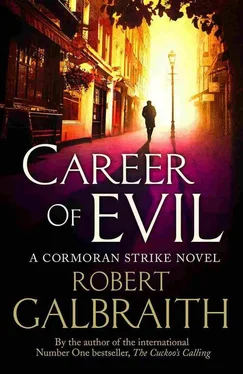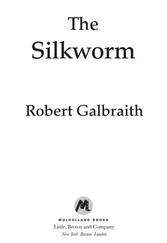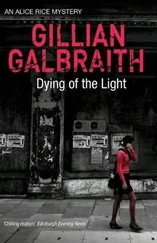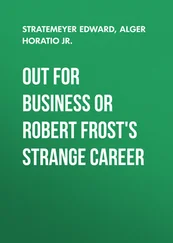“He liked death, Whittaker; he liked bodies. He claimed he’d been a gravedigger when he was a teenager. He had a thing about corpses. People took him for a hardcore goth or some ten-a-penny poseur — the necrophiliac lyrics, the Satanic Bible, Aleister Crowley, all that crap — but he was an evil, amoral bastard who told everyone he met he was an evil, amoral bastard and what happened? Women fell over themselves to get at him.
“I need a drink,” said Strike. He got up and headed for the bar.
Robin watched him go, slightly taken aback by his sudden rush of anger. His opinion that Whittaker had murdered twice was unsupported by either the courts or, as far as she knew, police evidence. She had become used to Strike’s insistence on the meticulous collection and documentation of facts, his oft-repeated reminders that hunches and personal antipathies might inform, but must never be allowed to dictate, the direction of an investigation. Of course, when it was a case of Strike’s own mother...
Strike returned with a pint of Nicholson’s Pale Ale and a couple of menus.
“Sorry,” he muttered when he had sat back down and taken a long pull on the pint. “Thinking about stuff I haven’t thought about for a long time. Those bloody lyrics.”
“Yes,” said Robin.
“For fuck’s sake, it can’t be Digger,” said Strike in frustration, running a hand through his dense, curly hair and leaving it entirely unchanged. “He’s a professional gangster! If he’d found out I gave evidence against him and wanted retribution he’d have bloody shot me. He wouldn’t fanny about with severed legs and song lyrics, knowing it’d bring the police down on him. He’s a businessman.”
“Does Wardle still think it’s him?”
“Yeah,” said Strike, “but he should know as well as anyone the procedures on anonymous evidence are watertight. You’d have coppers lying dead all over town if they weren’t.”
He refrained from further criticism of Wardle, though it cost him an effort. The man was being considerate and helpful when he could be causing Strike difficulties. Strike had not forgotten that the last time he had tangled with the Met they had kept him in an interrogation room for five solid hours on what appeared to be the whim of resentful officers.
“What about the two men you knew in the army?” asked Robin, dropping her voice because a group of female office workers were settling themselves at a table nearby. “Brockbank and Laing. Had either of them killed anyone? I mean,” she added, “I know they were soldiers, but outside combat?”
“It wouldn’t surprise me to hear Laing had done someone in,” said Strike, “but he hadn’t, as far as I know, before he went down. He used a knife on his ex-wife, I know that — tied her up and cut her. He spent a decade inside and I doubt they managed to rehabilitate him. He’s been out over four years: plenty of time to commit murder.
“I haven’t told you — I met his ex-mother-in-law in Melrose. She reckons he went to Gateshead when he got out of the nick and we know he might have been in Corby in 2008... but,” said Strike, “she also told me he was ill.”
“What kind of ill?”
“Some form of arthritis. She didn’t know the details. Could an unfit man have done what we saw in those photos?” Strike picked up the menu. “Right. I’m bloody starving and you haven’t eaten anything except crisps for two days.”
When Strike had ordered pollock and chips and Robin a plowman’s, he made another conversational swerve.
“Did the victim look twenty-four to you?”
“I–I couldn’t tell,” said Robin, trying and failing to block the image of the head with its smooth chubby cheeks, its frosted-white eyes. “No,” she said, after a brief pause. “I thought it — she — looked younger.”
“Me too.”
“I might... bathroom,” said Robin, standing up.
“You OK?”
“I just need a pee — too much tea.”
He watched her go, then finished his pint, following a train of thought he had not yet confided to Robin, or indeed anyone else.
The child’s essay had been shown to him by a female investigator in Germany. Strike could still remember the last line, written in neat girlish handwriting on a sheet of pale pink paper.
The lady changed her name to Anastassia and died her hair and nobody ever found out were she went, she vanished.
“Is that what you’d like to do, Brittany?” the investigator had asked quietly on the tape Strike had watched later. “You’d like to run away and vanish?”
“It’s just a story!” Brittany had insisted, trying for a scornful laugh, her little fingers twisting together, one leg almost wrapped around the other. Her thin blonde hair had hung lank around her pale, freckly face. Her spectacles had been wonky. She had reminded Strike of a yellow budgerigar. “I only made it up!”
DNA testing would find out soon enough who the woman in the fridge had been, and then the police would trawl backwards to see who Oxana Voloshina — if that was her name — really was. Strike could not tell whether he was being paranoid or not in continuing to worry that the body belonged to Brittany Brockbank. Why had the name Kelsey been used on the first letter to him? Why did the head look so young, still smooth with puppy fat?
“I should be on Platinum by now,” said Robin sadly, checking her watch as she sat back down at the table. One of the office workers beside them seemed to be celebrating her birthday: with much raucous laughter from her colleagues she had just unwrapped a red and black basque.
“I wouldn’t worry about it,” Strike said absently, as his fish and chips and Robin’s plowman’s descended in front of them. He ate silently for a couple of minutes, then set down his knife and fork, pulled out his notebook, looked something up in the notes he had made back in Hardacre’s Edinburgh office and picked up his phone. Robin watched him key in words, wondering what he was doing.
“Right,” said Strike, after reading the results, “I’m going to Barrow-in-Furness tomorrow.”
“You’re — what?” asked Robin, bewildered. “Why?”
“Brockbank’s there — or he’s supposed to be.”
“How do you know?”
“I found out in Edinburgh that his pension’s being sent there and I’ve just looked up the old family address. Someone called Holly Brockbank’s living in the house now. Obviously a relative. She should know where he is. If I can establish that he’s been in Cumbria for the last few weeks, we’ll know he hasn’t been delivering legs or stalking you in London, won’t we?”
“What aren’t you telling me about Brockbank?” Robin asked, her blue-gray eyes narrowing.
Strike ignored the question.
“I want you to stay at home while I’m out of town. Sod Two-Times, he’s got only himself to blame if Platinum cops off with another punter. We can live without his money.”
“That’ll leave us with a single client,” Robin pointed out.
“I’ve got a feeling we’ll have none at all unless this nutter’s caught,” said Strike. “People aren’t going to want to come near us.”
“How are you going to get to Barrow?” asked Robin.
A plan was dawning. Hadn’t she foreseen this very eventuality?
“Train,” he said, “you know I can’t afford a hire car right now.”
“How about,” said Robin triumphantly, “I drive you in my new — well, it’s ancient, but it goes fine — Land Rover!”
“Since when have you had a Land Rover?”
“Since Sunday. It’s my parents’ old car.”
“Ah,” he said. “Well, that sounds great—”
“But?”
“No, it’d be a real help—”
“ But? ” repeated Robin, who could tell that he had some reservations.
Читать дальше











